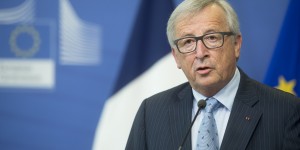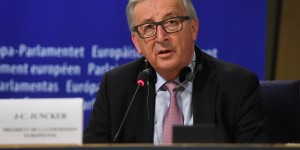This year marks the 75th anniversary of the Wannsee conference, where with cold, bureaucratic precision plans were laid out by the Nazi leadership to exterminate European Jews. As the years pass and as we become further removed from those events, the stronger is our duty to stand back and take the time to remember and reflect. “Memory has become a sacred duty of all people of goodwill”. This is the lesson we have received from Nobel Prize Winner Elie Wiesel, who died last year after devoting his life to be a voice for the survivors of the atrocities of the Shoah.
Our duty becomes even more compelling as every year the survivors and direct witnesses of the Holocaust become fewer and fewer, leaving the younger generations with the responsibility to carry a message that cannot lose its strength. We will not cease to say “We remember”!
This is also the first time that we remember the Holocaust without the presence of former German President Roman Herzog, recently passed away. It was he who in 1996 enshrined into German law the 27th of January as the Day of Remembrance of Nazi victims. This gesture set in motion a process that would lead the United Nations to declare in 2005 this day as the International Holocaust Remembrance Day, marking the 60th anniversary of the liberation of the Nazi extermination camp in Auschwitz-Birkenau on the 27th of January 1945.
The European Union is a project rooted in the history of the European continent and fully shares this duty of remembrance. In these challenging times, memory is not only a reminder of the past, it is a compass for the future to not repeat the same mistakes and to not fall into the same traps like we have done so by allowing discrimination and hatred to spread. Elie Wiesel saw the dangerous seeds sowed by growing hatred. He recognised the threat this new tide represented and spoke up early against Antisemitism raising its ugly head again in Europe – in new forms – long before many others.
History warns us that hatred can quickly tilt into incitement and violence. For this reason, the EU has made tackling hatred and hate speech, where it arises, a priority. The European Commission agreed in May 2016 on a code of conduct with the largest IT companies and social media platforms to monitor and remove within 24 hours illegal hate speech that is flagged to them. This complements existing legislation the European Commission enforced which criminalizes actions and words that publicly condone, deny or grossly trivialise the Holocaust.
Today, when “fake news” are easily spread, there cannot be any complacency regarding Holocaust denials. This applies regardless of the forms in which they are disguised: whether it is the so called “hard” Holocaust denial, denying that the Holocaust ever happened – criminalized by law – but also the insidious alleged “soft” Holocaust denial, which emerges in the downplaying of the scale and depth of the evil embodied by the Shoah, or the questioning of the relevance of the Holocaust for today’s world as well as in the attempts to belittle the Holocaust by pointing to other situations.
In the face of rising Antisemitism and other types of hatred, in the face of a resurgence of incidents incited by violence, the European Commission is determined to prevent and combat Antisemitism in all its forms and to ensure that Jews can lead the lives they want to live in Europe. Europe will continue to be a place of peace and tolerance where bridges are built and intolerance and discrimination resisted.
Jean-Claude Juncker
President of the European Commission



